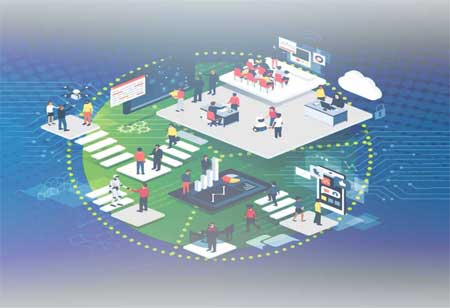THANK YOU FOR SUBSCRIBING
Empowering Citizen Developers with Low-Code/No-Code Platforms
Low-code and no-code platforms democratize app development, enabling non-coders (citizen developers) to actively participate in creating applications, and reshaping the software development landscape.

By
Apac CIOOutlook | Friday, December 01, 2023
Stay ahead of the industry with exclusive feature stories on the top companies, expert insights and the latest news delivered straight to your inbox. Subscribe today.
Low-code and no-code platforms are revolutionising software development by empowering citizen developers with limited coding experience, promoting collaboration, rapid application development, and reduced IT dependency.
FREMONT, CA: Low-code and no-code platforms democratize app development, enabling non-coders (citizen developers) to actively participate in creating applications, and reshaping the software development landscape. This paradigm shift is transforming the way businesses create software, fostering innovation, and accelerating digital transformation.
Understanding Low-Code/No-Code Platforms
Low-code and no-code platforms provide a visual development environment that allows users to design, build, and deploy applications with minimal hand-coding. The key distinction between the two lies in the level of coding expertise required. Low-code platforms typically involve some level of coding, albeit at a higher abstraction level, while no-code platforms require zero coding skills.
Empowering Citizen Developers
Accessibility and Inclusivity: Low-code and no-code platforms break down traditional barriers to entry, enabling individuals from various departments, such as marketing, finance, and operations, to actively contribute to application development. This inclusivity promotes collaboration between IT professionals and non-technical staff, ensuring that the development process aligns closely with business requirements.
Rapid Application Development: Citizen developers can swiftly create applications using pre-built components and visual interfaces. This accelerates the development lifecycle, allowing organizations to respond quickly to changing business needs. Rapid application development reduces time-to-market and empowers teams to iterate and refine their solutions efficiently.
Reduced Dependency on IT: With low-code and no-code platforms, citizen developers can take on a more active role in creating and maintaining applications without heavy reliance on IT departments. This independence fosters innovation within departments, enabling them to address specific challenges and opportunities without causing bottlenecks in the development pipeline.
Flexibility and Customisation: Citizen developers can tailor applications to their specific requirements, enhancing the flexibility and customisation of solutions. This agility allows organisations to adapt quickly to evolving market conditions, regulatory changes, or internal process optimisations.
Low-code and no-code platforms are empowering citizen developers to become active contributors to the software development process. By fostering collaboration, accelerating development cycles, and promoting innovation, these platforms are reshaping the way organizations approach application development. While challenges exist, the benefits of increased accessibility, rapid development, and reduced IT dependency make low-code and no-code platforms invaluable tools in the era of digital transformation. As organisations continue to embrace these platforms, the role of citizen developers is set to become increasingly integral to the success of modern businesses.





